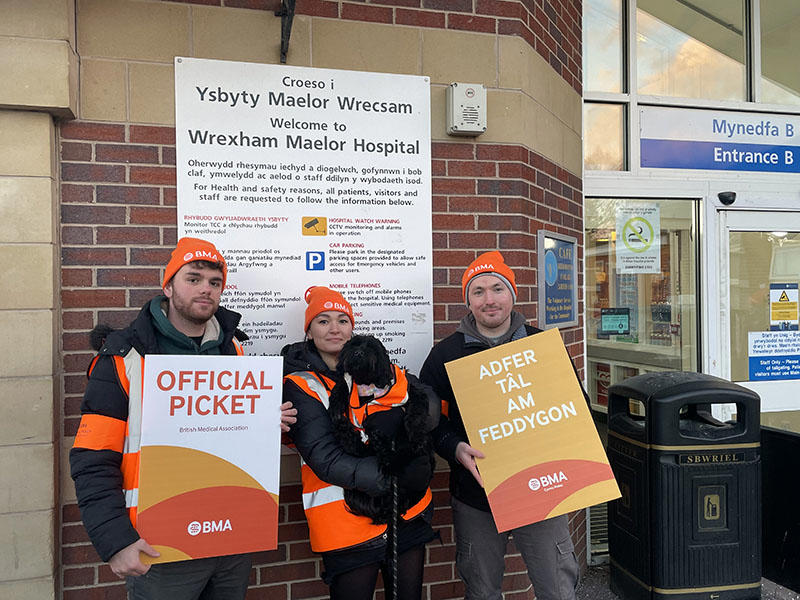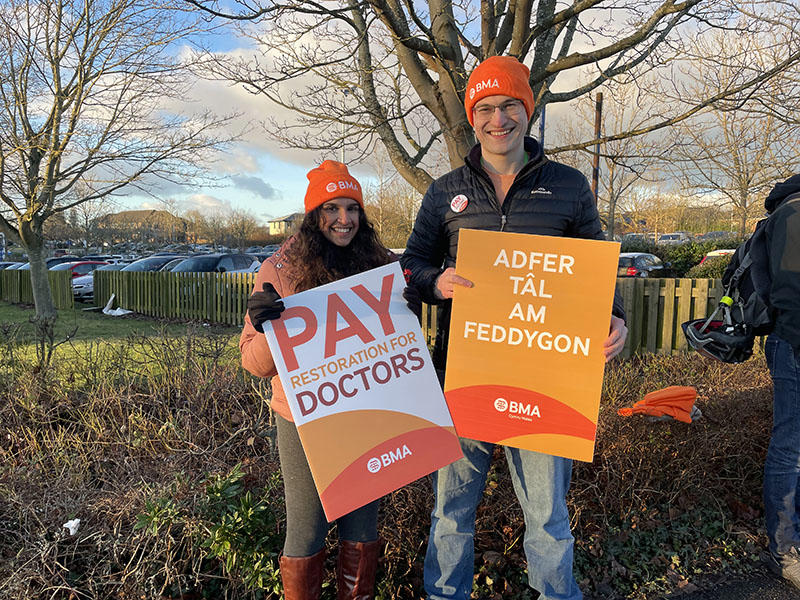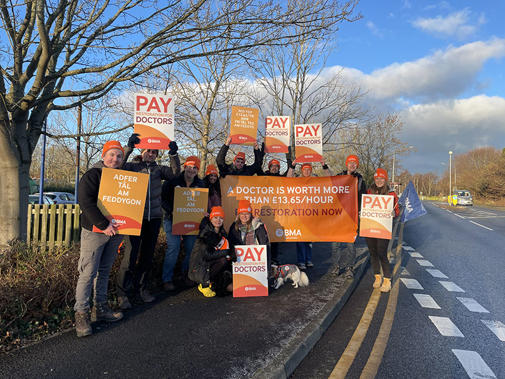‘Every person I’ve told, that junior doctors earn as little as £13.65 an hour has been absolutely gobsmacked,’ says foundation year 1 Jack Crewe.
Welcome to Wrexham Maelor Hospital, where some of the 4,000 junior doctors in Wales began their 72-hour walkout on a frosty Monday morning on 15 January.
It is the first time junior doctors in Wales have taken strike action in the BMA’s current pay restoration campaign, a year on from the first ballot of colleagues in England.
They have faced a similar story of pay erosion, with a 29.6 per cent drop in real-terms earnings since 2008/09 – and have been left earning less per hour than colleagues in England and Scotland.
To boot, junior doctors in Wales were offered just a 5 per cent pay uplift last year, the lowest uplift offered to junior doctors in the UK and below even the recommendation of the Review Body on Doctors' and Dentists' Remuneration, which a Conservative Party backbencher has admitted is ‘basically rigged’.
Poor offer
The situation compares unfavourably even to England, where a 6 per cent uplift and one-off lump sum was imposed on junior doctors in July, leading to further strike action.
Only junior doctors in Scotland have settled their pay dispute, after being offered a rise of 17.5 per cent over two years plus a commitment to work towards pay restoration by the devolved Scottish government.
The Welsh government had also committed to the principle of pay restoration, back in April 2023, but despite that offered less than other nations in the UK. It blames the Conservative Government in Westminster for a lack of funding to do so.
Welsh health minister Eluned Morgan told the BBC: ‘We would like to address their pay restoration ambitions, but the pay award offer we have made is at the limits of the finances available to us.’
 IN LINE: Drs Crewe, Nagaoka and McCann
IN LINE: Drs Crewe, Nagaoka and McCann
Dr Crewe says: ‘Ultimately, the money is handed down from Westminster, but the devolved Government has something to answer for because they can make their own decisions. It’s not been fair for a long time, and they backed down when they had the chance to do something about our pay.’
Michael Gardiner, a core trainee 2 in anaesthesia and Welsh junior doctors committee rep, says doctors in Wales had been ready to ballot for strike action earlier but wanted to give the Welsh Government the opportunity to make a fair offer. ‘The sentiment of calling for full pay restoration has always been there,’ he says. ‘We feel just as undervalued.’
The proof is in the pudding, doctors argue. ‘You need to at least make a start,’ says Dr Crewe. ‘Everyone has had their pay cut. Offering less than everywhere else is just unrealistic.’
Doctors on the picket line in Wrexham say they see colleagues leaving in their droves, resulting in an under-staffed hospital which affects patient care.
Staffing concerns
Phoebe Nagaoka, a foundation year 3, works regularly as a locum so she can be more in control of her working life. She works on the escalation ward which she says is staffed almost exclusively by locum doctors and bank nurses – a pertinent example of the ‘horrific’ staffing levels faced.
Foundation year 2 Gwil McCann said the workload he and colleagues face has been ‘unmanageable’ at times, pushing many to burnout. ‘We’re not talking about doctors burning out after 10 years,’ he says. ‘We’re talking about two years in. It’s non-stop.’
‘We are already expected to go above and beyond. If we don’t make a stand it will keep on getting worse and worse. If the pay was fair, the working conditions would be better.
‘At the moment, it’s like we’re putting bandage on top of a bleed, but we need to stop that bleeding. If you keep expecting junior doctors to work at the rate they are working without compensating them fairly, more and more will leave.’
Foreign shores
Like their colleagues in England, doctors in Wales are tempted to move to far-flung destinations such as Australia and New Zealand but they can also move within the UK for better pay or training opportunities, even if working conditions are just as challenging.
‘Almost everyone on our level has friends who are in Australia, some of whom won’t come back,’ says Dr Gardiner. ‘If the Welsh government doesn’t address the pay issue they are going to lose more highly skilled individuals.’
 Drs D'Costa and Gardiner
Drs D'Costa and Gardiner
He gives an example of a colleague, a specialty trainee 4, who can only afford to send their child to nursery if they pick up extra shifts. ‘That’s the reality, but that shouldn’t be the case,’ he says.
Surgical core trainee 2 Steph D’Costa says staff shortages make an already difficult job ‘more stressful’ – and notes how many elective procedures were being cancelled before strike action was even called – because staffing levels are too low.
‘The hospital is completely full,’ she says. ‘We don’t have enough staff to see any more patients. You can feel the pressure every day.’
Had enough
Dr D’Costa says some of her medical friends are considering leaving the profession altogether because of poor working conditions and burnout. ‘When you see people with shorter full-time hours, who can work from home, not work weekends and get paid more than you, it’s tempting,’ she explains.
‘Being a doctor is a vocation, but that is being pushed to its limits. Going into it, you know the job is going to have responsibility, you know you’re going to be making important, life or death decisions, no matter how “junior” you are.
‘But equally you would expect that such levels of responsibility come with pay that reflects that. All we’re asking for is fair pay for hard work.’
Patients' support
Doctors in Wrexham report that patients are on their side.
‘Most people have been overwhelmingly supportive,’ says Dr Crewe. ‘Those who aren’t have a fundamental misunderstanding of what we earn.’
Dr McCann adds: ‘You can’t blame them because that’s the narrative they’ve been given by government. Whenever you break it down to people, they end up fairly supportive.’
Dr Gardiner agrees and says that, once patients understand the level of pay versus the level of responsibility junior doctors face, they understand their reasons for taking strike action.
‘The first doctor that most patients see when they arrive at hospital is most likely to be an FY1,’ he explains. ‘People are shocked when they hear that those doctors can be paid as little as £13.65 an hour.’

